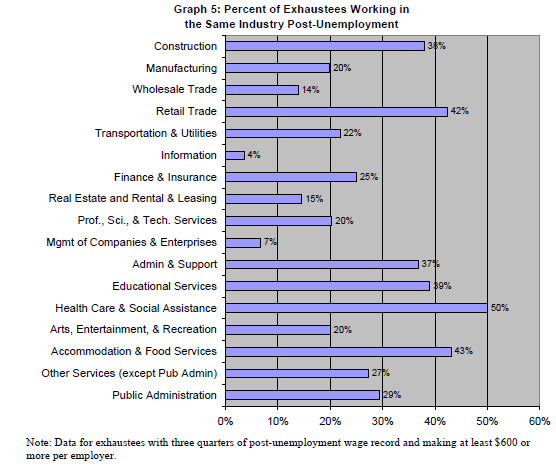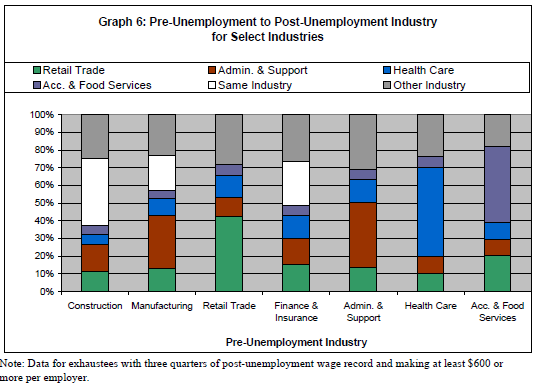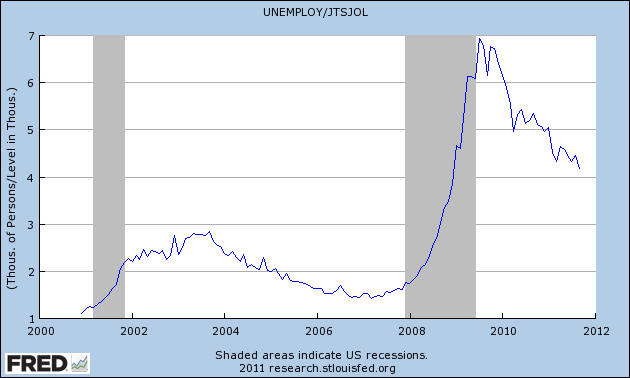Barry did a masterful, comprehensive job of exposing The Big Lie for what it is. And although these zombie lies, regrettably, never really die, it is imperative that the facts be made known. There are many other lies of varying sizes still out there, both large and small. That unsubstantiated talking points become conventional wisdom via the echo chamber in which they’re repeated is very troubling, though it has become the reality in which we live. Personally, I find it repugnant no matter who is doing it. What follows is but the latest chapter in a saga I’ve been following for some time — how some folks view Americans who have fallen on hard times.
I wrote here, in March 2010 (and not for the first time*), about what I thought were absurd claims about how extending unemployment benefits were nothing more than a disincentive to the unemployed to find work and that folks found new work toward the tail end of their benefits or just after they expired. At the time, Senator Jon Kyl had said that unemployment relief “doesn’t create new jobs. In fact, if anything, continuing to pay people unemployment compensation is a disincentive for them to seek new work.” Tom DeLay agreed with the notion that people were unemployed because they want to be. I followed that piece up here shortly thereafter when the San Fran Fed release a study showing that an “analysis of unemployment data suggests that extended unemployment insurance benefits have not been important factors in the increase in the duration of unemployment or in the elevated unemployment rate.” Finally, a few months ago, I posted about a WSJ story that cited yet another report: “There’s a chance extended benefits actually increase the number of Americans who find new jobs, according to the study.”
Well, now we have the states of Washington [pdf] and Connecticut [pdf] publishing separate reports that have tracked their respective unemployment insurance exhaustees. The news is not good, but it does starkly repudiate the claim that folks are unemployed because they want to be or that extending benefits is a disincentive to find work.
First, from the Washington report (emphasis mine):
In April 2011, the Employment Security Department conducted a survey of people in Washington who had used up all of their unemployment benefits to learn about their current employment situation, programs or services they used to look for work and barriers they encountered during their search. […]
Only about 25 percent of those who responded to the survey had found work. […]
Eight in 10 reemployed exhaustees who responded to the survey were earning less money than they did prior to becoming jobless. At the time of the survey, the average wage of reemployed exhaustees was $18.12. The average wage for the same group was $25.38 prior to becoming unemployed.
Of the exhaustees responding to the survey who have not found work, more than 86 percent were still looking for work, and nearly half said age is their greatest barrier to finding work.
Let’s recap: Of UI exhaustees, only 1 in 4 had found work, and 80 percent of those did so at about 70 percent of their pre-unemployment wages.
From the Connecticut study (pdf, emphasis mine):
Using Connecticut’s UI wage records to analyze reemployment finds that only 24.7% of individuals who exhausted benefits by the end of March 2011 were reemployed in the second quarter of 2011.
Worth noting is that both studies found the same percentage — 25 percent — of exhaustees had found new work. Looked at the other way, it implies that 75 percent of those who exhausted their benefits remained unemployed, some perhaps voluntarily (i.e. retirement), most probably involuntarily.
Connecticut also found the majority of the exhaustees who found work doing so at lower wages:
A comparison of post-unemployment earnings as a percent of pre-unemployment earnings finds that 65% of reemployed exhaustees are making 75% or less of what they previously earned. Another 10% of reemployed exhaustees are earning between 75% to 90% of their prior earnings, and about 25% are making 90% or more of their prior wage.
The Connecticut study also found an apparent willingness — dare I say necessity — by individuals to cross industry lines to take work, as few tend to find employment in the same industry they left (e.g. 75 percent of those in Finance and Insurance — a big industry in Connecticut — did not resurface in that sector):
Here is a graph showing the cross-industry movement:
Conclusion of the Connecticut report:
Based on UI wage records only about 25% to 35% of exhaustees find employment, and even for those that are reemployed, most are making less than they previously earned.
Also, we can easily see that as the recession unfolded, the sheer number of unemployed simply swamped the number of job openings, which should have been fairly self-evident to anyone who was paying attention. Below is the number of unemployed per job opening over the past decade:
So, what planet do you have to live on to believe the canard that for most of the unemployed it’s a matter of choice? That people milk the system for what they can and then find a new job in the waning weeks of benefits or just after they expire? That it’s a choice to be unemployed and then go back to work for 75 percent or less of what you were previously making? Can we get serious here? Americans are not lazy and want to work — just give them a chance. Of course there are going to be people who game the system — there always have been and always will be (and is it really controversial any more to assert that the system is being gamed far more — and for much, much bigger dollars — at the top of our capitalist structure than at the bottom?). But it is simply offensive to claim that the majority of Americans who have fallen on hard times and had to rely on our social safety nets are doing so as a matter of choice and because they want to, because they’re happy to suckle at the public teat. And it’s particularly hypocritical coming from a group that tends to hurl the pejorative “unpatriotic” at the drop of a hat.
(*All of my prior work at another venue — Blah3.com, where I cut my teeth starting in the mid-aughts — appears to have been lost in some sort of web-hosting disaster. It is my hope that Don will somehow be able to recover what’s been lost. If not, I will be bummed beyond words.)





What's been said:
Discussions found on the web: